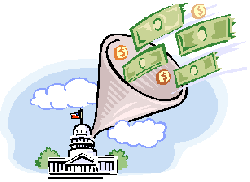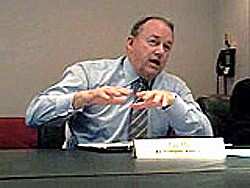Writes Letter To Pelosi, Boehner
 ATA's James May seems to think that
increased PFCs are not in the air travel industry's best interests.
While ATA has been all for levying a number of additional charges
on the rest of the industry, at various times, ATA seems to think
that additional Passenger Facility Charges are not a good thing.
One wonders, though, how much support ATA might have had from the
rest of the aviation community, if it hadn't alienated other
members of the aviation world when it (previously) tried to force
other charges on them. So, instead of the rest of aviation helping
out as their natural allies in the aviation universe... many are
still stinging from ATA's past attacks...
ATA's James May seems to think that
increased PFCs are not in the air travel industry's best interests.
While ATA has been all for levying a number of additional charges
on the rest of the industry, at various times, ATA seems to think
that additional Passenger Facility Charges are not a good thing.
One wonders, though, how much support ATA might have had from the
rest of the aviation community, if it hadn't alienated other
members of the aviation world when it (previously) tried to force
other charges on them. So, instead of the rest of aviation helping
out as their natural allies in the aviation universe... many are
still stinging from ATA's past attacks...
Hmmmm...
Herewith, ATA Letter To Speaker Pelosi and Minority Leader
Boehner:
On behalf of the Air Transport Association and the major U.S.
commercial air carriers and their passengers, I write in strong
opposition to the proposed increase in the passenger facility
charge (PFC) contained in H.R. 915, the FAA Reauthorization Act of
2009. I urge you to make the Minnick amendment in order, so that a
full debate can occur about whether to increase passenger taxes
during a time of severely weakened travel demand.
H.R. 915 will significantly raise the cost of air travel, with
passengers paying as much as $2 billion more each year in PFC taxes
to supplement already amply-funded airport coffers. The legislation
would authorize a $7 passenger facility charge on passengers
passing through their airports – a 56 percent tax increase
over today’s maximum $4.50 head tax. On a round-trip ticket
with one stop – the most commonly purchased ticket from
passengers traveling from small and mid-sized communities –
each passenger could be charged $28 in PFCs. A family of four could
pay upward of $112 in PFCs alone.
 Such an unprecedented PFC tax
increase ignores the current economic realities and the effect of
the downturn on the airline industry. In fact, an April 2009
Government Accountability Office (GAO) report to Congress
underscores the precarious state of the U.S. passenger airline
industry, citing the significant losses of over $4.3 billion in the
first three quarters of 2008. The GAO assessment for the year
continues, stating that “the demand for air travel now
appears to be weaker than expected – especially among
business and international travelers – and revenues appear to
be declining.”
Such an unprecedented PFC tax
increase ignores the current economic realities and the effect of
the downturn on the airline industry. In fact, an April 2009
Government Accountability Office (GAO) report to Congress
underscores the precarious state of the U.S. passenger airline
industry, citing the significant losses of over $4.3 billion in the
first three quarters of 2008. The GAO assessment for the year
continues, stating that “the demand for air travel now
appears to be weaker than expected – especially among
business and international travelers – and revenues appear to
be declining.”
By contrast, airports are well-funded already, with $27 billion
in unrestricted financial assets, including cash, at their
disposal. Airports enjoy an enviable financial status. Of the 77
airports rated by S&P, 77 are investment grade. They received
$13 billion each year from 2001-2005 for capital improvements
according to the GAO, in addition to billions in annual AIP funding
and billions more from airport concessions and other
nonaeronautical sources.
While PFCs can be used to fund projects that enhance safety,
security or capacity; reduce noise or increase air carrier
competition, many projects are controversial and of questionable
value, such as the “rails to nowhere” project proposed
in Phoenix. H.R. 915 even permits airports to use the additional
PFC funds to construct bicycle storage lockers. Modernization of
the nation’s outdated, inefficient air traffic control system
is what will reduce delays, not more money for airports to spend on
“nice to have” but nonessential projects.
Without question, the airport community has sufficient revenue
and financial integrity to fund necessary airport improvement
projects. The unjustified 55 percent tax increase would severely
impact passengers, particularly in small and mid-sized communities.
The U.S. commercial aviation industry drives over $1.1 trillion in
economic activity and 10.2 million domestic jobs. Yet airline
employment has dropped over 28 percent since 2001, marking a loss
of one out of every four industry jobs. There were over 28,000
layoffs last year alone, and thousands more are estimated for 2009.
The U.S. economy and the commercial airline industry cannot afford
regressive policies that inhibit economic growth or that add
additional fees and costs.

We urge you to reject this tax increase and other provisions in
H.R. 915 that preserve the status quo and do nothing to ensure the
badly needed modernization of the nation’s air traffic
control system.
James C. May, President and CEO, Air Transport
Association
 ANN's Daily Aero-Linx (12.03.25)
ANN's Daily Aero-Linx (12.03.25) ANN's Daily Aero-Term (12.03.25): CrewMember (UAS)
ANN's Daily Aero-Term (12.03.25): CrewMember (UAS) NTSB Prelim: Maule M-7-235A
NTSB Prelim: Maule M-7-235A Airborne-Flight Training 12.04.25: Ldg Fee Danger, Av Mental Health, PC-7 MKX
Airborne-Flight Training 12.04.25: Ldg Fee Danger, Av Mental Health, PC-7 MKX Aero-News: Quote of the Day (12.04.25)
Aero-News: Quote of the Day (12.04.25)





